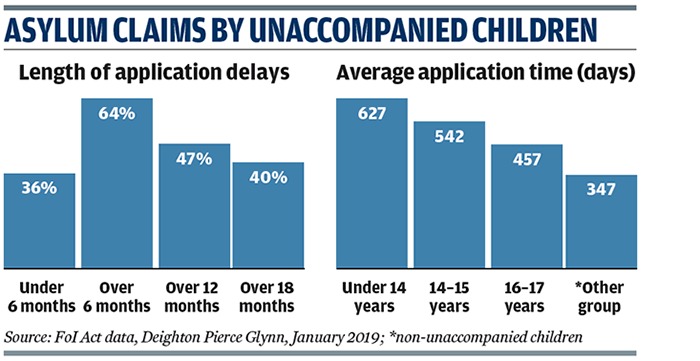Asylum delays spark legal action
Derren Hayes
Monday, April 29, 2019
Judicial review highlights concerns over the impact asylum delays have on unaccompanied children.

Delays in the asylum process are having a negative impact on the wellbeing of thousands of vulnerable unaccompanied children and the ability of councils to properly plan support for them, experts have warned.
Earlier this year, the High Court granted permission for judicial review in a claim challenging lengthy delays in deciding asylum applications made by unaccompanied children.
The case (see below) has highlighted the backlog in Home Office decision making for asylum applications from unaccompanied asylum-seeking children.
Figures obtained through the Freedom of Information (FoI) Act by lawyers involved in the case show that nearly two-thirds of 3,457 unaccompanied children had waited longer than six months for a decision on their asylum application.
Home Office policy is for a decision to be made within six months, but the FoI data reveals that 47 per cent of applications from unaccompanied children had been outstanding for more than 12 months, with some waiting in excess of three years (see graphics).

Longest delays
The longest delays are for unaccompanied children aged under 14, with applications taking 627 days on average compared to an average of 457 days for 16- to 17-year-olds. The average time for asylum applications of non-unaccompanied children was 347 days.
The delays are causing issues for local authorities, which have responsibility for caring for unaccompanied children and are required to develop pathway plans for their future.
The Local Government Association has been warning about the problem for some time.
David Simmonds, chair of the LGA's asylum, migration and refugee task group, says that due to the uncertainty over a child's future caused by the lengthy asylum process, children's services must develop two parallel care plans - one based on their application being successful and another for if it fails.
"The responsibility for the local authority is to try to plan in the best interests of the young person," he explains. "That means putting in place the same care package as for a child born in this country. This includes planning support for when they leave care, such as training and education placements they may go on to."
Simmonds says the "gumming up" of the asylum system also has a financial impact on cash-strapped councils because the cost of supporting unaccompanied children is not fully met by the Home Office.
- At-a-glance The case that triggered the judicial review
The case involves a claimant known as MK, who was brought to the UK directly from Calais by the Home Office when the "Jungle" refugee camp was dismantled in late 2016. Although he applied for asylum in the UK when he was under 18, he is now 20.
After court proceedings were issued, the Home Office granted MK asylum and has conceded that the delay in his case was unlawful.
Following an oral hearing in December, Mr Justice Lewis granted permission for the case to proceed to a full hearing to consider the arrangements for determining claims by unaccompanied children.
MK's lawyers, Deighton Pierce Glynn, are also acting on behalf of 11 other unaccompanied children who have faced similar delays. The majority are living with foster carers and the lawyers say the delay is "impeding their ability to study and integrate fully into the UK".
Lack of funding
Local authorities are able to claim £41,610 a year from the Home Office for unaccompanied children under 16 and £33,215 a year for unaccompanied children aged between 16 and 17, but Simmonds says the actual cost is around £55,000 a year.
The government has pledged to review funding levels councils receive by April, and the LGA has held meetings with ministers to make the case for more funding.
"It is obvious that the current system is unacceptable," says Simmonds. "The number of children is quite small, but the impact it has on individual authorities can be significant."
The delays are also having a profound effect on unaccompanied children, says Hayley Cohen, service manager at Young Roots, a charity that supports young refugees in London.
"They are in limbo and unable to move on and make plans," Cohen says. "It can have a profound impact on their emotional wellbeing and mental health - many will have already experienced trauma in their home country or on their journey to the UK and so this can exacerbate existing mental health issues."
Lottery system
Cohen says that the length of time it takes for the "substantive interview" to be arranged is contributing to the delays. This "is a lottery system", she adds, "sometimes it can be done quickly, other times it takes six months".
For children whose cases are "stuck", it can be hard for them to see friends who are granted asylum move on with their lives, she explains.
"They know their case needs to be resolved before they can progress longer term with their goals and dreams," she adds. "We want to encourage young people to think about that, but if their case is stuck, that's where their focus is."
Lengthy delays can also lead to frustration and negativity among young people, and increase the chance of them running away from a care placement, which in turn can put them at greater risk of being exploited by criminal gangs.
Cohen says the same timescales for deciding applications should be applied to all children.
"We need to speed things up - it is about having a system that provides the same standard of service for everyone," she adds.
The judicial review could go a long way to ensuring a more equitable system is developed when it is heard later this year.




